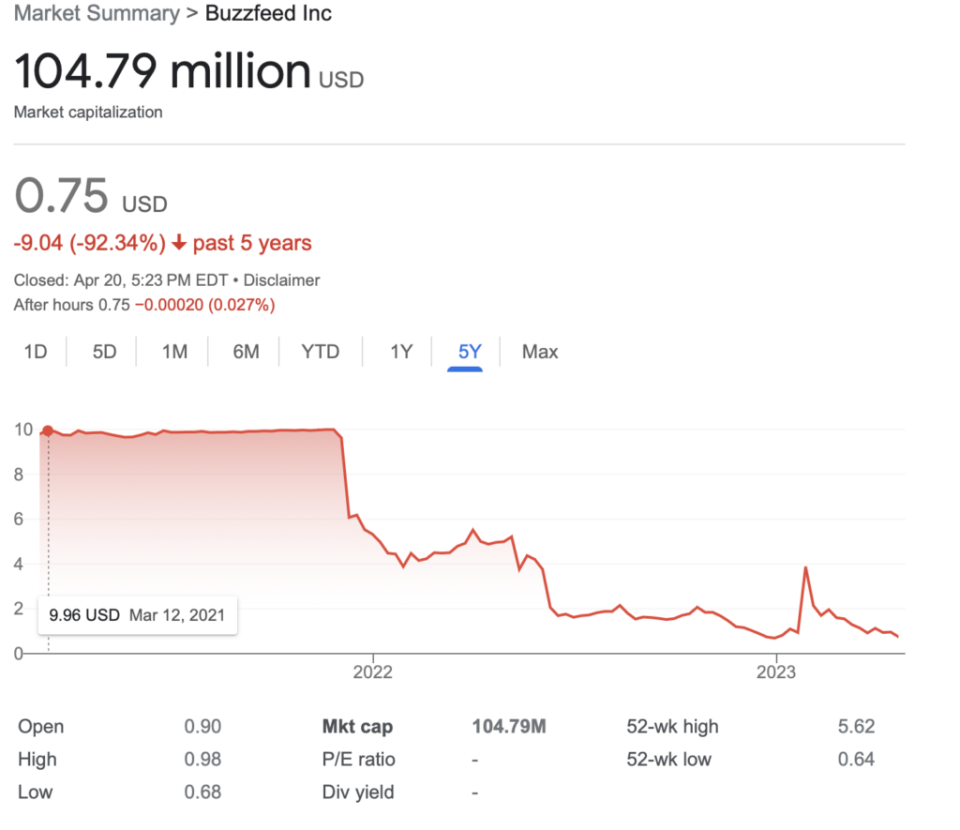RIP BuzzFeed News – What Was It All About?
“News is the heart and soul of any great media company.”
– BuzzFeed CEO Jonah Peretti, June 18, 2015
It started with cat videos. “What the hell is this?” I thought, as people around me in 2011 started talking about “viral videos.” We needed a social strategy that would … MAKE US GO VIRAL.
Like BuzzFeed.
The rise and fall of BuzzFeed — by which I mean BuzzFeed News — will live on as a cautionary tale in the annals of 21st-century media. The ambition. The overconfidence. The rapid conquest of an audience and then the race to go public and monetize it all.
It ended, Thursday, in tears, with founder and CEO Jonah Peretti writing a chest-pounding mea culpa the likes of which I have not seen since Yom Kippur as he announced the closure of BuzzFeed News:
“We’ve faced more challenges than I can count in the past few years,” he wrote in a memo to staff that oozed public shame and private guilt, a marked change from someone who for years asserted news dominance. “A pandemic, a fading SPAC market that yielded less capital, a tech recession, a tough economy, a declining stock market, a decelerating digital advertising market and ongoing audience and platform shifts …
“But I also want to be clear: I could have managed these changes better as the CEO of this company and our leadership team could have performed better despite these circumstances.” He added: “The macro environment is tough, but we had the potential to generate much more revenue than we delivered over the past 12 months.”
Never mind the wasted value to shareholders, as the company went from a $1.5 billion (inflated) valuation at the time of its SPAC deal in December 2021 to a market cap of $105 million. Consider that.

No, I’m thinking hardest about the wasted effort and dreams of hundreds of journalists who believed BuzzFeed was the future of journalism, as Peretti and others constantly preached.
BuzzFeed, went the story, was successfully using technology to challenge legacy players like the New York Times, leading a path forward for journalism and redefining news in the 21st century. After figuring out how to leverage social media, mostly Facebook, to drive millions of views and grow an audience of millions of Millennials, BuzzFeed was pivoting from cat videos and listicles and “The Dress” to real news.
Having articulated that vision, BuzzFeed, then led by Editor-in-Chief Ben Smith (now the co-founder of Semafor) set out to achieve it, hiring dozens of journalists from established institutions who bought the dream. The site broke some big stories, mostly in politics, and took some risks that paid off.
“Nine out of 10 Millennials know BuzzFeed and BuzzFeed News.”
– Jonah Peretti, Dec. 12, 2017
2014: BuzzFeed News wins National Press Foundation Award
2016: Wins National Magazine Award
2017: Publishes the controversial Steele dossier
2021: Wins George Polk Award and the Pulitzer Prize
The same year it won a Pulitzer, BuzzFeed went public through a SPAC merger. And the transparency and accountability of being a public company suddenly posed a challenge for Peretti’s fancy rhetoric.
Also Read:
This Story Was Not Written by a Robot: AI and the Future of News Media
As a private company, no one asked questions about BuzzFeed throwing a party at the Republican National Convention that nominated Donald Trump in 2016. Smith held court in the corner of the rooftop of a hip building in downtown Cleveland. He was a player and so was the site.
I texted Smith on Thursday after the news of the site’s closure. “Our goal was to build a news organization really embedded in social media, and as consumers turned against social media and social media turned against news, we never lost our footing,” he wrote back.
But BuzzFeed the company clearly lost its footing. As Google and Facebook ate up direct advertising, the company needed to get bigger. Facebook was no longer the viral playground it once was. Acquiring the Huffington Post — now just HuffPost — in a 2020 all-stock deal made it bigger, but not more profitable. Then BuzzFeed went and bought the urban lifestyle site Complex to get even bigger. But getting bigger took them further from the journalism.
“We are building a better model for digital journalism, with a focus on original documents and receipts.”
– Jonah Peretti, Jan. 3, 2020
For me, the die was clearly cast when the company filed paperwork for its IPO. BuzzFeed promised huge growth from its $300 million-plus in revenue by acquiring Complex and leaning into e-commerce. Selling stuff. Back to listicles that drive sales leads to Amazon? That translated away from journalism and into — what exactly?
Also Read:
BuzzFeed Forecasts a Dire Revenue Implosion in Q1
What was BuzzFeed if not a company defined in the public imagination by news? I don’t know the answer to that question today, and I don’t know if Peretti does either.
The tale of BuzzFeed News is notable in the media landscape because of how quickly it created credibility out of an audience built on viral nonsense, and how just as quickly a quest for growth and profit doomed its ability to sustain itself as a news organization.
Peretti admitted as much in his Thursday note: “I made the decision to overinvest in BuzzFeed News because I love their work and mission so much. This made me slow to accept that the big platforms
wouldn’t provide the distribution or financial support required to support premium, free journalism purpose-built for social media.”
In short: The idea didn’t work.
In my 14 years as a media entrepreneur and parallel life as a reporter, I’ve written plenty of news media obits. This one came as no great shock, though no less a tragedy for all that.
Also Read:
How Vice, Vox and BuzzFeed Blew the Future of Media


